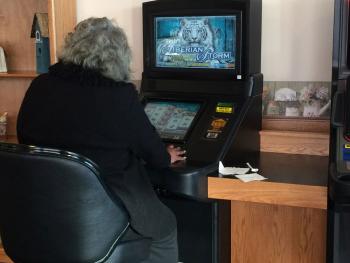 Just last month, the Lake County Board voted for an ordinance that may limit the types of businesses that offer video gambling in the county's unincorporated areas.
Just last month, the Lake County Board voted for an ordinance that may limit the types of businesses that offer video gambling in the county's unincorporated areas.
The new rule changes the liquor law to require that at least 60 percent of the establishment's annual gross revenue comes from food or beverage sales -- and that no more than 10 percent of its space is dedicated to video gambling.
The Lake County Board Chair says the move is intended to avoid the proliferation of video gaming cafés.
A light-filled café in a Melrose Park strip mall might look homey with knick-knacks on the shelves, flowers on the tables, and snacks on the counter -- but it also pours drinks, and for that reason, it can have video gambling by the wall.
“I'm playing Siberian Storm,” said Ethelene Morrison who lives just 10 blocks away from Dotty's café.
“I like the game, I enjoy myself,” she said. “I don’t have any kids. It's just something to do, something exciting for people our age. It’s not a hell of a lot of things for us to do. We don't party a lot, and it's entertaining.”
Morrison says she can gamble just as much at the café as at a casino, but she can spend less money.
“I never play the max. I always play 40 cents because you can win just as big and your money lasts longer,” she said.
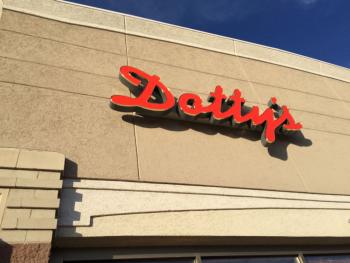 When video gambling machines went live in Illinois two years ago, Dotty's wasted no time establishing 34 locations across the state.
When video gambling machines went live in Illinois two years ago, Dotty's wasted no time establishing 34 locations across the state.
“We definitely want to be as homey and as comfortable as possible. We're located in well-lit shopping centers. Our lights are always on here. We have as many windows as we possibly can to provide natural light, and for folks just to feel very comfortable and safe,” said Dotty's CEO Dan Fischer.
And even these locations have plenty of company.
Records from the Illinois Gaming Board, analyzed by a group called Stop Predatory Gambling, show 1,250 video gambling machines operating at more than 280 cafés in Illinois. Seventy-four more are awaiting approval by the gaming board.
The group says the majority of those cafés are owned and operated by the same five companies.
They often have feminine names aimed at appealing to women, like Penny's or Stella's.
Fischer explains the idea is to appeal to people who aren't comfortable in a typical bar.
“Illinois is one of the first states in a number of years that has brought on video gaming as a new line of business,” he said. “Most of the other states have had it for 15 to 20-plus years. So obviously it's a little bit of an expansion that would be driven by market because there’s a lot of people in Illinois. It’s a great place to do business.”
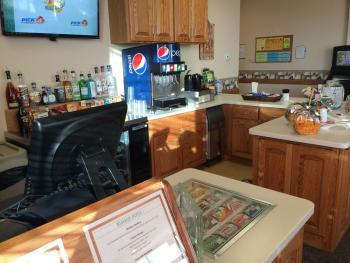 But critics say cafés like Dotty's weren't the kind of businesses intended when the legislature legalized video gambling back in 2009.
But critics say cafés like Dotty's weren't the kind of businesses intended when the legislature legalized video gambling back in 2009.
“The original law said that there were three groups: truck stops, fraternal organizations, and veterans groups. The fourth was any place that poured liquor for consumption. The intention was probably directed toward neighborhood taverns; they were experiencing some difficulty with the economy,” said John Alan Boryk of Stop Predatory Gambling.
Boryk says the cafés are proliferating by taking advantage of a loophole of the law.
“It's horrendous. That's money that doesn't create anything. It's just lost of out of the community, and businesses are suffering,” said Boryk. “In places like Loves Park, in the Rockford area, people are driving by there. It has changed the landscape. It looks more like Las Vegas at its worst than a nice community. What can happen is that people will be reluctant to purchase homes in places that have that kind of an atmosphere.”
But Fischer argues his cafés fit every intent of the law by hiring 225 new employees and filling 35 vacant storefronts across the state.
“This was empty. It’s a newer shopping center, but this had been vacant for two or three years,” said Fischer. “There had never been a business here before, and we obviously did a wonderful build-out now.”
What's more, Boryk is concerned about people like Melynda Litchfield, one of 11,000 people in Illinois who have voluntarily placed themselves on the state's Self-Exclusion Program for Problem Gamblers.
“They are prohibited from going into any water- or land-based casinos in Illinois without the threat of being arrested for trespassing. And again, it is a lifetime ban,” she said.
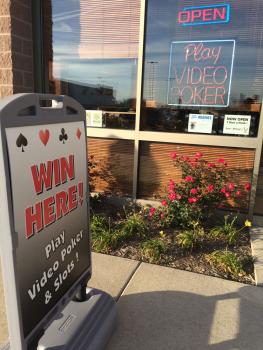 But that list only applies to casinos.
But that list only applies to casinos.
Which means Litchfield can walk into any café, bar, or restaurant -- and gamble.
Litchfield says she hasn't gambled in years, and is now a victim's advocate. She already knows of problem gamblers who've fallen off the wagon since video gambling cafés have started popping up.
“Especially if they are new in the recovery process when it’s the most vulnerable. There’s absolutely a temptation,” said Litchfield. “At the end of the day, I understand that the onus is on the individual not to walk into one of these places to begin with, but my analogy is, if someone walked into a bar and declared they were an alcoholic but they really wanted a drink, would the bartender say, ‘that’s OK’ and put a Bourbon in front of him and encourage him to drink more? Of course not. That sounds preposterous. It just sets up people to fail. It beckons people to fail. This self-exclusion list now has no respect or no credibility at all.”
Mike Gelatka is the president of the Illinois Gaming Machine Operators Association, which he says works with the Alliance on Problem Gambling to protect people with addictions. The rest, he says, is up to the local governments.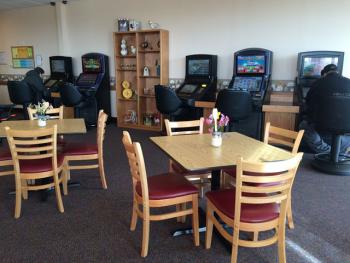
“And that's the beauty of the Video Gaming Act is that every café that's here has been approved by the municipality to be here. They’ve been given a liquor license,” Gelatka said. “Any municipality that doesn't want one will have the ability to ask the new owner that’s coming to them, and say, ‘what are you going to do with that liquor license?’”
Gelatka says if local residents don't want the cafés in their towns, they should take it up with their elected officials.
The Illinois Gaming Board says it is aware of the challenge that the machines pose for problem gamblers, and are working on a solution.
But to create a second Self-Exclusion List for cafés alone would pose challenges like the time it takes to implement and enforce a list.



